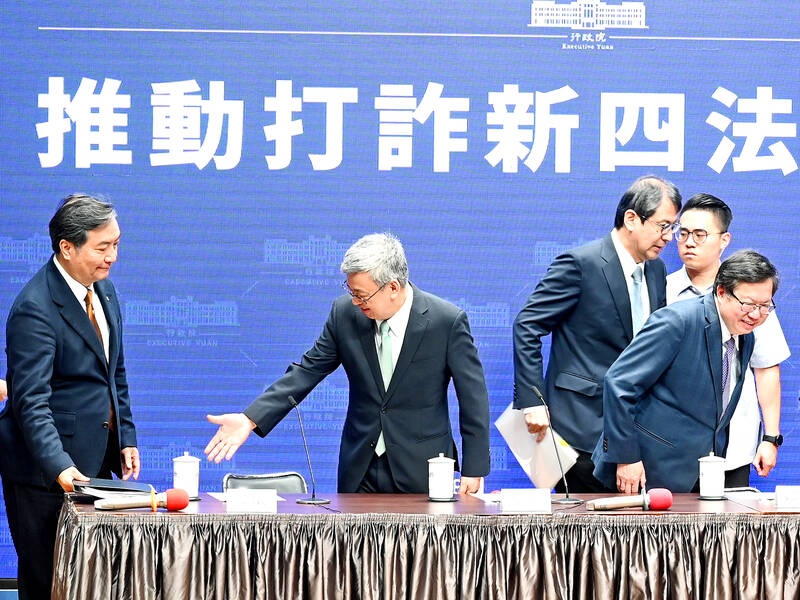The Executive Yuan yesterday approved a slew of bills targeting fraud by raising the penalty for convicted scammers, increasing police surveillance powers and compelling social media platforms to remove scam advertisements.
The bills aim to build a legal framework to aid the government’s fight against fraud, Premier Chen Chien-jen (陳建仁) told a news conference in Taipei also attended by Vice Premier Cheng Wen-tsan (鄭文燦), Minister Without Portfolio Lo Ping-cheng (羅秉成), Ministry of Justice representative Kuo Yung-fa (郭永發) and Minister of Digital Affairs Audrey Tang (唐鳳) after an Executive Yuan meeting.
A proposed anti-fraud bill would define severe fraud as actions that cost victims NT$10 million (US$308,071) or more in losses, the officials said.

Photo: Wang Yi-sung, Taipei Times
Severe fraud would be punishable by a sentence of three to 10 years and a fine of up to NT$30 million, they said.
A 50 percent sentencing enhancement would be applied to main offenders if the crime involved three or more co-conspirators, impersonation of government officials or use of deepfake technology, they said.
Repeat offenders would be subject to harsher sentences for each new conviction and lose the possibility of parole on their third jail sentence for committing severe fraud, they said.
The punishment could be lessened or remitted if the offender surrenders before the crime is discovered and returns all ill-gotten gains, the officials said.
Cooperation with authorities resulting in the main offender’s identification could also reduce or remit the penalty, they added.
A separate technological surveillance and protection draft act would empower police to use snooping devices, they said.
Police surveillance is to be governed by increasingly strict scrutiny with privacy violation and power abuse concerns in mind, officials said.
The bill defines conditions in which the use of surveillance devices is acceptable, they said, adding that previous rules governing the destruction of data obtained by snooping still apply.
Authorization of the use of GPS trackers, fake cell towers and thermal imagers or other devices capable of surveillance without physical intrusion would be subject to the least, intermediate and highest levels of scrutiny respectively, they said.
The bundle of bills included amendments requiring foreign-based social media platforms to register and have a legal representative in Taiwan to ensure compliance with measures targeting advertisements for scams, officials said.
Platforms that operate without a legal representative or do not comply with government orders to remove an ad would be subject to a fine of NT$2.5 million to NT$25 million, they said.
Severe breaches of the act could lead to other sanctions, including bandwidth limits and being blocked from the Internet in Taiwan, they said.
The standards for applying the proposed legislation on platforms are to be established administratively and would likely encompass Facebook, TikTok and Google, Tang said.

MAKING WAVES: China’s maritime militia could become a nontraditional threat in war, clogging up shipping lanes to prevent US or Japanese intervention, a report said About 1,900 Chinese ships flying flags of convenience and fishing vessels that participated in China’s military exercises around Taiwan last month and in January last year have been listed for monitoring, Coast Guard Administration (CGA) Deputy Director-General Hsieh Ching-chin (謝慶欽) said yesterday. Following amendments to the Commercial Port Act (商港法) and the Law of Ships (船舶法) last month, the CGA can designate possible berthing areas or deny ports of call for vessels suspected of loitering around areas where undersea cables can be accessed, Oceans Affairs Council Minister Kuan Bi-ling (管碧玲) said. The list of suspected ships, originally 300, had risen to about

DAREDEVIL: Honnold said it had always been a dream of his to climb Taipei 101, while a Netflix producer said the skyscraper was ‘a real icon of this country’ US climber Alex Honnold yesterday took on Taiwan’s tallest building, becoming the first person to scale Taipei 101 without a rope, harness or safety net. Hundreds of spectators gathered at the base of the 101-story skyscraper to watch Honnold, 40, embark on his daredevil feat, which was also broadcast live on Netflix. Dressed in a red T-shirt and yellow custom-made climbing shoes, Honnold swiftly moved up the southeast face of the glass and steel building. At one point, he stepped onto a platform midway up to wave down at fans and onlookers who were taking photos. People watching from inside

Japan’s strategic alliance with the US would collapse if Tokyo were to turn away from a conflict in Taiwan, Japanese Prime Minister Sanae Takaichi said yesterday, but distanced herself from previous comments that suggested a possible military response in such an event. Takaichi expressed her latest views on a nationally broadcast TV program late on Monday, where an opposition party leader criticized her for igniting tensions with China with the earlier remarks. Ties between Japan and China have sunk to the worst level in years after Takaichi said in November that a hypothetical Chinese attack on Taiwan could bring about a Japanese

The WHO ignored early COVID-19 warnings from Taiwan, US Deputy Secretary of Health and Human Services Jim O’Neill said on Friday, as part of justification for Washington withdrawing from the global health body. US Secretary of State Marco Rubio on Thursday said that the US was pulling out of the UN agency, as it failed to fulfill its responsibilities during the COVID-19 pandemic. The WHO “ignored early COVID warnings from Taiwan in 2019 by pretending Taiwan did not exist, O’Neill wrote on X on Friday, Taiwan time. “It ignored rigorous science and promoted lockdowns.” The US will “continue international coordination on infectious